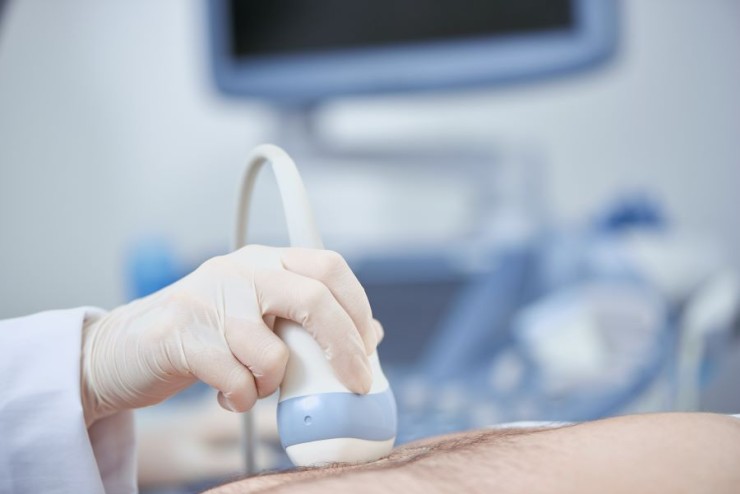
The Renal Doppler Test is a diagnostic examination designed to assess blood flow within the renal arteries and veins, which play a crucial role in kidney function.
Renal Doppler in India with Cost
Renal Doppler Test: A Comprehensive Overview
The Renal Doppler Test is a diagnostic examination designed to assess blood flow within the renal arteries and veins, which play a crucial role in kidney function. Using Doppler ultrasound technology, this non-invasive test provides valuable insights into the vascular health of the kidneys. Here is a detailed exploration of the Renal Doppler Test.
Purpose of the Renal
Doppler Test
The primary purpose of the Renal Doppler Test is to evaluate blood circulation within the renal arteries and veins. This test is essential for identifying conditions such as renal artery stenosis, blood flow abnormalities, or renal vascular diseases that may impact kidney function.
Procedure
During the Renal Doppler Test, a handheld device called a transducer emits high-frequency sound waves towards the renal arteries. The echoes produced by these sound waves create real-time images of blood flow within the kidneys. This imaging helps healthcare professionals assess the presence of any abnormalities, blockages, or reduced blood flow.
Preparing for the Test
Preparation for the Renal Doppler Test is usually minimal. Patients may be advised to avoid eating or drinking for a few hours before the test to enhance image clarity. It's essential to inform the healthcare provider about any medications or pre-existing conditions.
Signs and Symptoms Leading to the Renal Doppler Test
The Renal Doppler Test is recommended when individuals exhibit symptoms or have risk factors associated with renal artery stenosis or renal vascular conditions. Symptoms may include uncontrolled hypertension, sudden kidney function decline, or other signs of renal impairment.
Understanding the Test Results
Test results from the Renal Doppler provide detailed information about blood flow in the renal arteries and veins. This information assists healthcare professionals in diagnosing conditions affecting renal vasculature and guiding appropriate treatment.
Conditions Detected by the Renal Doppler Test
The Renal Doppler Test is instrumental in detecting various conditions, including renal artery stenosis, renal vascular diseases, or blood flow abnormalities impacting kidney function. Detecting an issue early enables timely intervention and the implementation of preventive measures.
Importance in Nephrology
In the field of nephrology, the Renal Doppler Test holds significant importance. It serves as a valuable tool for assessing renal vascular health, diagnosing conditions affecting kidney function, and guiding healthcare providers in formulating appropriate treatment strategies.
Limitations and Considerations
While the Renal Doppler Test is highly informative, it may not capture all potential renal issues. Additional tests or assessments may be recommended for a more comprehensive evaluation, depending on individual cases.
What to Expect During the Test
The Renal Doppler Test is a painless and non-invasive procedure. Patients lie comfortably, and the healthcare provider applies a gel to the abdominal area before using the transducer to capture images. The entire process is conducted in a controlled and private setting.
Interpreting Test Results
Nephrologists and healthcare professionals interpret the Renal Doppler Test results to identify specific vascular issues affecting kidney function. Based on these findings, they can recommend treatments ranging from lifestyle modifications to medications or interventional procedures.
Conclusion
In conclusion, the Renal Doppler Test is a crucial diagnostic tool for assessing the vascular health of the kidneys. Its non-invasive nature and ability to provide real-time imaging make it an invaluable component in the comprehensive evaluation of renal function.
Frequently Asked Questions (FAQs) - Renal Doppler Test
1. What is the duration of a Renal Doppler Test?
The Renal Doppler Test usually lasts between 30 to 60 minutes, contingent upon the complexity of the examination and individual factors.
2. Is the Renal Doppler Test painful?
No, the Renal Doppler Test is a non-invasive and generally painless procedure. Patients may feel slight pressure from the ultrasound transducer, but discomfort is minimal.
3. Is there any preparation needed before a Renal Doppler Test?
Minimal preparation is usually required. Patients may be advised to avoid eating or drinking for a few hours before the test to enhance image clarity. Informing the healthcare provider about medications and medical history is crucial.
4. How often should someone undergo a Renal Doppler Test?
The frequency of Renal Doppler Tests depends on specific symptoms, risk factors, or ongoing renal concerns. Healthcare providers will recommend the appropriate schedule based on individual needs.
5. Can the Renal Doppler Test detect all renal issues?
While the Renal Doppler Test is highly informative, it may not capture all potential renal issues. Additional tests or assessments may be recommended for a more comprehensive evaluation, depending on individual cases.
6. What symptoms warrant a Renal Doppler Test?
Symptoms such as uncontrolled hypertension, sudden kidney function decline, or signs of renal impairment may warrant a Renal Doppler Test. Healthcare providers assess individual cases based on symptoms and medical history.
7. Is the Renal Doppler Test safe during pregnancy?
The safety of the Renal Doppler Test during pregnancy may vary. It's essential for pregnant individuals to inform their healthcare provider about their pregnancy status to assess the appropriateness of the test.
8. Can the test be performed on individuals with kidney stones?
Yes, the Renal Doppler Test can often be performed on individuals with kidney stones. However, specific cases may require additional considerations, and healthcare providers will assess individual situations.
9. Are there any risks associated with the Renal Doppler Test?
The Renal Doppler Test is considered safe with minimal risks. Patients may experience mild discomfort, but serious complications are rare. Healthcare providers take necessary precautions for patient safety.
(0)
Login to continue



